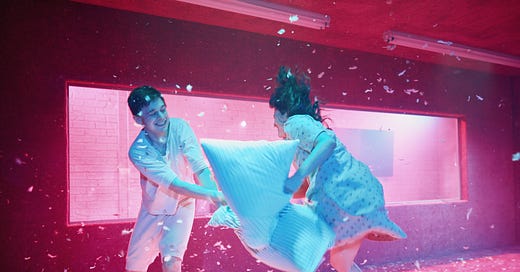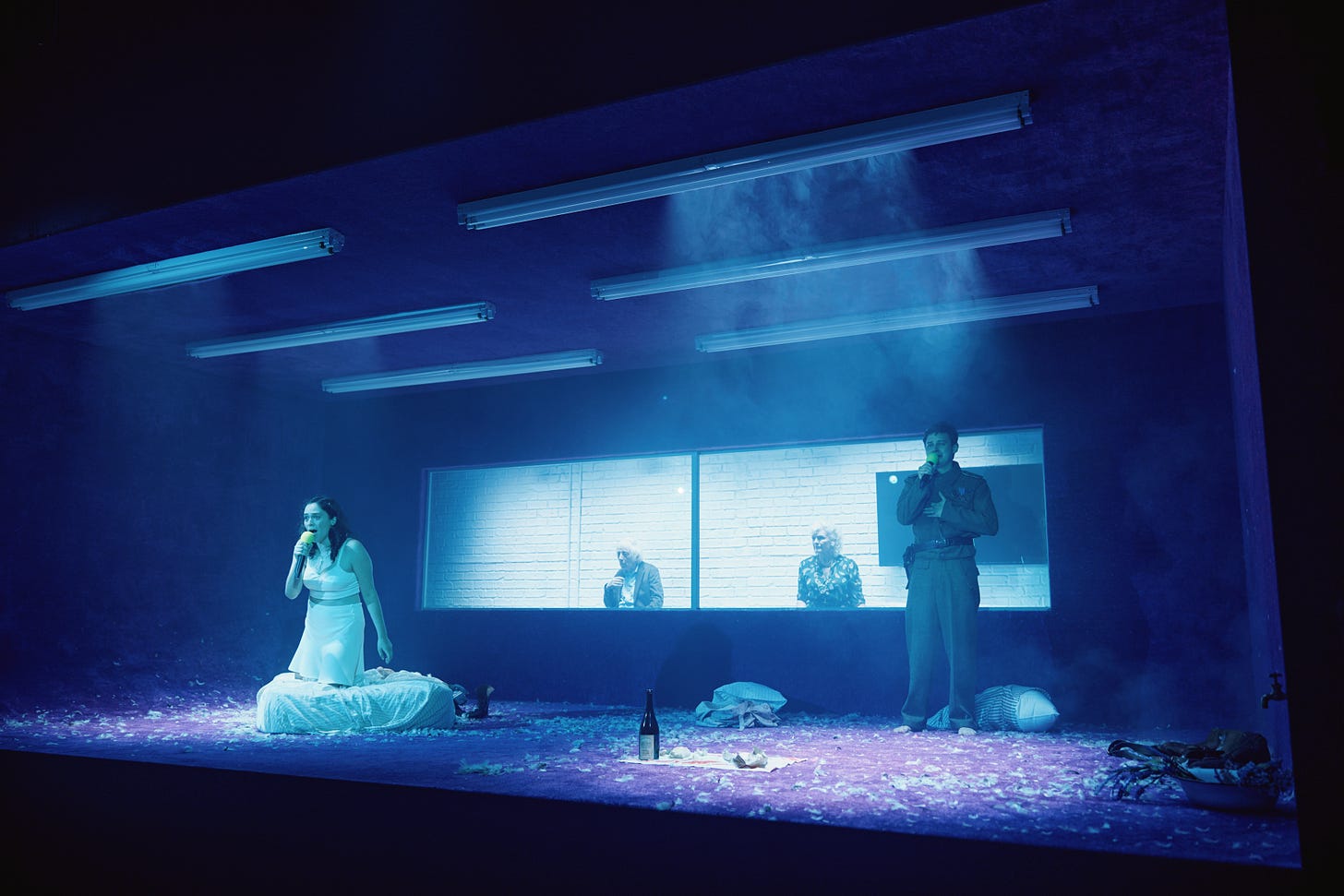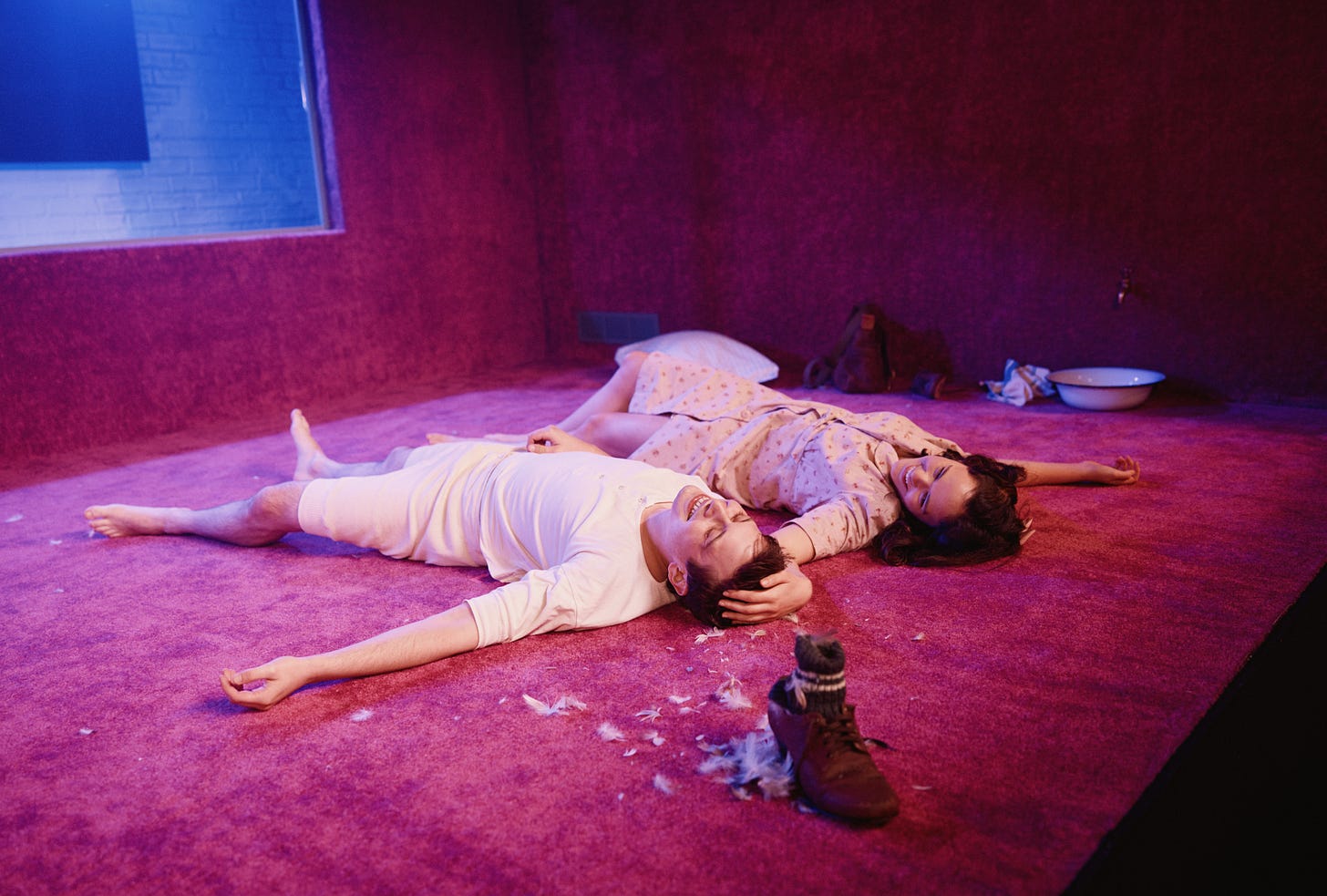Young Love and Indefensible Evil: The Dilemma of "This Beautiful Future"
Lead producer Oliver Roth discusses Rita Kalnejais' divisive play, empathy for hateful characters, and the state of off-Broadway commercial producing
The poster for the new off-Broadway play This Beautiful Future features two cherubic faces, a boy and a girl, gazing hopefully upwards as feathers fall around them. The young lovers hold hands. “Uncomplicated first love in a complicated world,” reads the tagline.
The average audience member might not guess, glancing at this show art, that Australian playwright Rita Kalnejais’ work is set in the final days of World War II. Or that the innocent-looking boy on the left is a Nazi soldier.
This Beautiful Future debuted in London in 2017, then landed in New York this January, in a modest, two-week run at New York’s Theaterlab that earned a New York Times “Critic’s Pick.” The same production, directed by Jack Serio, has now transferred off-Broadway to the Cherry Lane Theatre in the West Village, where it runs through October 23.
The move was an unusual one in our current theatrical landscape. To the extent that commercial off-Broadway exists at all, it is mostly dominated by musicals with existing brand recognition (Little Shop of Horrors, Stranger Sings), family shows, or low-budget tourist traps. This Beautiful Future has no major stars, nor is its playwright well known here.
And then there is the play itself—hard enough to describe even without the added challenge of tip-toeing around the word “Nazi.” (Spoilers follow, naturally.) 16-year-old German soldier Otto (Uly Schlesinger) meets secretly with 17-year-old French girl Elodie (Francesca Carpanini) in an abandoned home, formerly occupied by a Jewish family. They flirt and tease; Otto tells her how many people he shot that day; they pillow fight; he speaks excitedly about “a future that’s clean.” Meanwhile an older man and woman (Austin Pendleton & Angelina Fiordellisi) watch them behind glass, occasionally interrupting to sing karaoke, lament their life’s regrets, and wonder how things could have been different.
I spoke with This Beautiful Future’s lead producer Oliver Roth about the decision to transfer this work, how Kalnejais’ play speaks to our current moment, and the precarious state of off-Broadway commercial producing. Roth is a producer and C.E.O. at OHenry Productions. His past credits include Slave Play, The Inheritance and Little Shop of Horrors at the Westside Theatre.
How did you first discover This Beautiful Future, and how did the play’s off-Broadway transfer come together?
Jack Serio, our director, put together this very small production at Theaterlab in January. It was a 40-seat theater and ran for two weeks, so to say it was “the talk of the town” is a little bit of an exaggeration. But at a time when Omicron was tearing through the city, it was exciting that there was this bold new work happening.
Then I got lunch with Jack. I was a little hungover and had forgotten to take my ADD pills. So the first three things out of my mouth were: “I’m a little hungover; I’m off my meds; and I loved the play, but I’m not going to do this play–so let’s talk about what else you’re doing.” By the end of the lunch, I was still very hungover and unmedicated, but I was somehow doing the play.
So it wasn’t actually that I saw it and was like: “This has to go off-Broadway.” It was the conversations that happened afterwards. What I love about the piece is that it requires a lot of the audience. It is deeply profound, but so not heavy-handed, maybe even to a fault. It just gives you these circumstances that are confusing, and challenging, and to some people very off-putting, and says: “Deal with this.” So I really loved the way that this play asks you to reflect within yourself, and makes you talk through your feelings about it.
I came into the play totally blind at Theaterlab, which I think is how you want audiences to walk into it at the Cherry Lane. But at the same time, if you are pitching the play as a love story, and then people discover that one half of that love story is a Nazi soldier–some audiences will immediately reject that. So how do you approach the balance of keeping that surprise, versus how much the surprise might be unfair to the audience?
We’ve talked about this a lot. The play is now open, and I’m still grappling with this question. Because in terms of producing this piece, it is the toughest question. There is no way to describe this play without it seeming like a love story and a period piece. And it is both of those, but it’s also neither.
The thing that I found most compelling at Theaterlab was that I, a Jewish man, felt for this Nazi very strongly. And that is a weird thing. It is definitely also triggering. There are people who just shut off as soon as they realize they’re being asked to watch this teenage Nazi romance. For me, it turns out there are even Nazis I can feel compassionate for. And is that wrong of me, or is it not? I don’t know. The play, without being heavy-handed, asks you to reckon with that.
I’ve had a lot of conversations about the play and antisemitism. To me, despite it not being written to have a single Jewish character onstage, I find it in some ways a very Jewish play.
How so?
Deep in Jewish learning is the idea that no one thing can completely destroy a person. In Catholicism and Christianity, if you do one bad thing, that’s it, goodbye, hell. Looking at a human as a complex thing is this innately Jewish thing, Judaism is so much about that.
The play is really boring if you think its stance is that this Nazi should be forgiven. It requires that you hate this kid.
Francesca Carpanini has said that her character’s decisions are “inexcusable” and that both characters are “indefensible in so many ways.” So that’s the challenge you’re describing, empathizing with two characters while finding them inexcusable.
[Kalnejais] wrote this play in 2016 in response to Trumpism and Brexit ravaging both sides of the Atlantic, and it was her way of grappling with this question of: “How much can I find humanity in those I vehemently disagree with and find morally repugnant?”
Elodie gives us a window into that moral dilemma. She has a lot of friends who have died or have gone missing. She’s young and naive, and doesn’t really know what all of that means—but she knows that Otto is a part of it. And she’s also got this youthful love for him. Elodie acts as a way to access the play for people who don’t wish to [feel for] Otto.
No one actually says on stage that Otto is indefensible and that his actions are evil, which is maybe something people are expecting to hear spoken aloud.
But Elodie does in her way, when she tells him that Germany has lost the war. [Elodie informs Otto, who believes Germany is close to victory, that American forces are arriving to take back Paris the next day.] That’s her way of saying, you are a shithead and a racist.
You can be upset that it’s a Nazi and you’re being asked to see him as a human, and that no one says “You’re a shithead” in explicit terms. Or you can acknowledge: this is confusing, because I see him as more than a Nazi, but he is definitely a Nazi. And if he’s a brainwashed youth, is there a moral difference? This is a conversation that can go on forever, which is why I produced the play.
I’d love to switch topics and ask about the current landscape for off-Broadway commercial producing.
My sense is that the economics of producing off-Broadway have become increasingly prohibitive. It is very rare to see a new work like This Beautiful Future produced commercially off-Broadway. Why did you pursue this transfer despite those increasing challenges?
I was part of the off-Broadway transfers of Sweeney Todd and Little Shop of Horrors, as an investor and co-producer respectively, and as musicals with established titles, those represent a formula for success that has withstood.
Broadway has been going through a cost issue for a decade. The cost issue closed a lot of shows during the pandemic, and during Omicron. Because of Covid we’re now also seeing a volume issue on Broadway, where attendance is down and the top ticket prices aren’t selling at the same rate. So everything that goes into your formula—costs, volume, price—is in a worse place than it was before.
So my feeling is, this might be a golden opportunity for commercial off-Broadway. The formula for This Beautiful Future was, it seems hard to fill a 500-2,000 seat theater with the audience we have right now; but here I have a 179-seat theater, and this piece appeals to the more local audience that has come back. If I can get those people, who are open to experimental work, into this little cul-de-sac in the West Village, we could maybe find a new route for the commercial off-Broadway formula.
It remains to be seen whether we were right. And obviously it’s not as simple as I just made it out to be, every show has so many variables in play. But that was the idea: those audiences seem to be ready to come back, so let’s produce something that doesn’t bank on the masses or on tourists, and let’s see if that formula works–because you’re right, it hadn’t in the past. It remains to be determined whether it will.








… I would challenge the producer’s version of Catholicism, but otherwise, very insightful. love the Cherry Lane, might check it out. thanks Joey!